 Many salespeople swear by cold calling. But the inherent problem with it? Interrupting people when they're otherwise engaged. The person might be amenable – or might be turned off.
Many salespeople swear by cold calling. But the inherent problem with it? Interrupting people when they're otherwise engaged. The person might be amenable – or might be turned off.
“We spent a lot of time cold calling or direct emailing,” said Craig Robertson, co-founder and CEO of ecycler.com. “We would catch people when they were busy and they didn't want to talk to us.”
ecycler.com, founded in 2009, is an Internet-age twist on the cash-for-cans concept. Rooted in the belief that one man's trash is another man's treasure, the site connects recycling discarders with collectors for mutual benefit.
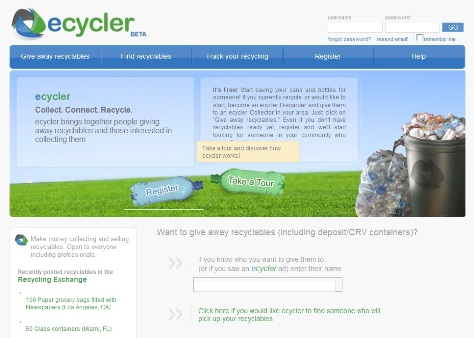
As a start-up, ecycler.com needed to build its signups of both discarders and collectors quickly. Founders took to social media to grow awareness among businesses and individuals.
Well beyond posting on Twitter and Facebook, their proactive tactics made a real difference. From securing in-person meetings to landing media and blog coverage, the scrappy partners' use of social tools has rapidly grown signups and earned the company a sweet grand prize in a small business challenge.
ecycler.com
Social Media Handles & Stats:
- Website: www.ecycler.com
- Twitter: 8,200 followers
- Facebook: 9,568 fans
- YouTube.com: 73 videos
- Blog
Highlights:
- On average, the company lands one meeting per week with potential partners, collectors or discarders through Twitter.
- In a 3-month challenge, ecycler.com added 151 collectors and 623 discarders.
- ecycler.com regularly receives coverage from relevant bloggers by meeting them first on Twitter.
- Visual and interactive posts on Facebook make the site the #1 social media source of traffic, generating about 10% of all ecycler.com traffic.
From Trash to Treasure
If you're of a certain age, you may remember the days when people collected and recycled aluminum cans not because they were green, but because they wanted to earn some green – cash from recycling stations.
With so many curbside programs now, those recycling spots have largely disappeared. But there's still money to be made.
ecycler.com co-founders Timothy Laurent and Craig Robertson were children of the can recycling era. As a Cub Scout, Laurent raised funds for his troop with aluminum cans, while Robertson took the same route to buy his first computer.
Years later, the college friends, now both with prestigious Big Four consulting backgrounds, hatched their business idea over coffee.
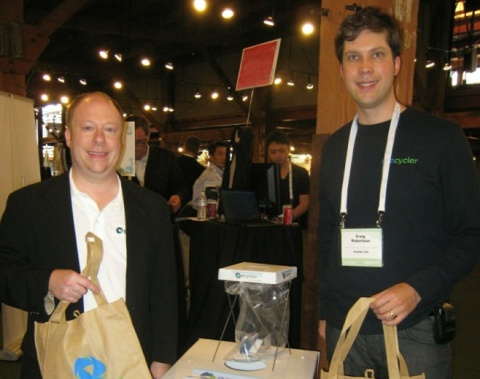
The concept is simple. Someone wanting to discard (“discarders”) recyclable items posts them on the site, where a “collector” can then arrange to pick them up locally. For smaller, lighter items like eyeglasses, discarders can now ship to collectors.
Get World-Class Marketing Training — All Year Long!
Are you facing doubt, uncertainty, or overwhelm? The Social Media Marketing Society can help.
Each month, you’ll receive training from trusted marketing experts, covering everything from AI to organic social marketing. When you join, you’ll also get immediate access to:
- A library of 100+ marketing trainings
- A community of like-minded marketers
- Monthly online community meetups
- Relevant news and trends updates
In many places in the U.S. today, there's still real money in recycling: 10 cents for a glass bottle in Michigan, 5 cents for cans and bottles in California, and 67 cents for a pound of cans in Northern Illinois.
Currently, 10 states have “bottle bills” that legislate the value of these recyclables. But even in non-bottle–bill states, cans, bottles, paper and cardboard can be exchanged for cash.
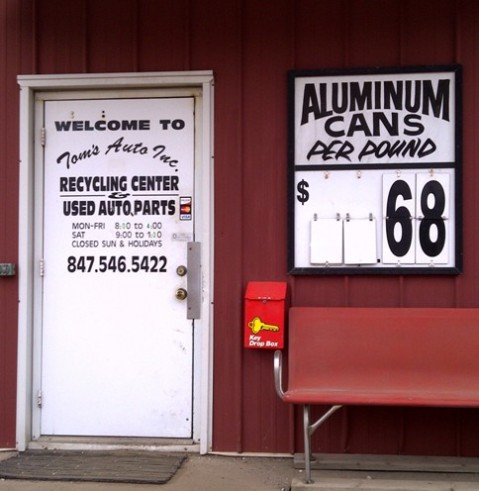
Those now cashing in through ecycler.com run the gamut from business owners of recycling centers to church groups to teachers wanting cash to fund an in-classroom pet.
But Laurent and Robertson have found the market for reusable goods extends well beyond the typical items. Collectors can even be artists looking for specific items for their work, like corks, compact discs or keys.
While the service is currently free to both collectors and discarders, ecycler.com foresees that collectors will be willing to pay for the opportunity to connect with discarders.
Finding Targets With Twitter Search
From the start, the founders have used social media to spread the word about the business and drive traffic to the website. They began with Twitter and still find the tool a top powerhouse for their business.
“Twitter is our main communications channel out,” Laurent said.
With posts that interest discarders, collectors and other recycling enthusiasts, ecycler.com has grown its followers to more than 8200. The partners frequently post items such as welcomes to new collectors, twitpics and YouTube videos, updates on bottle-bill legislation, or answers to questions about recycling in general.

The small team at ecycler.com uses tools to make it simple to update the Twitter stream. When a new collector signs up on ecycler.com, the site uses the Twitter API to tweet automatically each new collector's location and types of items collected. That alerts potential discarders who might be in that geographic area with those items.

Discover Proven Marketing Strategies and Tips
Want to go even deeper with your marketing? Check out the Social Media Marketing Podcast! Publishing weekly since 2012, the Social Media Marketing Podcast helps you navigate the constantly changing marketing jungle, with expert interviews from marketing pros.
But don’t let the name fool you. This show is about a lot more than just social media marketing. With over 600 episodes and millions of downloads each year, this show has been a trusted source for marketers for well over a decade.

Additionally, the partners proactively use search tools to identify those talking about recycling and find organizations to partner with. Beyond basic Twitter.com searches, they use TweetDeck, IceRocket and notify.me to find relevant activity. With the latter, Robertson sets up automatic email notifications to himself for certain keywords and phrases such as “I just recycled” or “I recycle cans.”
From there, they follow collectors and potential partners; hoping following is the first step in expanding business relationships.
Twitter for In-Person and Phone Meetings
Most notably, the two tap Twitter to make connections that open doors for meetings. The partners found that using a traditional approach didn't take them very far in connecting with businesses that might become discarders.
When Laurent and Robertson switched their outreach from traditional measures to social media, they noticed a difference.
“We were reaching people when they wanted to be reached, when they want to have a conversation – not when we wanted to have a conversation,” Robertson said.
First, they got to know targets by watching tweets. Then, they started conversations on Twitter with retweets or @ messages directed to the business. “The next thing you know, we'd have a meeting planned,” Robertson said.
Now, the partners estimate they establish at least one new meeting every week through social media.
Fostering Blog Relationships
The duo largely uses the same approach for forging relationships with bloggers and media contacts, leading to significant coverage. First, they search for prominent bloggers in the green space and begin following them.
After retweeting, introductions and exchanging information, bloggers or media outlets often write about the company.
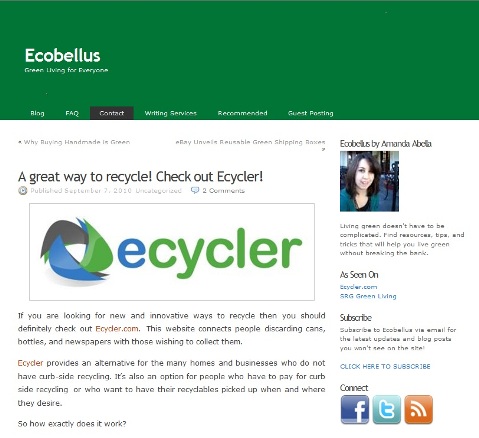
In turn, those posts drive legitimate traffic back to the ecycler.com website, helping grow the base of collectors and discarders.
Engaging Fans With Visual Posts
While Twitter has generated one-on-one connections, Facebook and YouTube pull traffic to the ecycler.com site with a more visual, interactive component.
Facebook allows the company to start discussions and share information that's more than 140 characters. Nearly every Facebook post includes a photo or link to a video, helping increase engagement. Such engaging Facebook content succeeds in generating about 10% of the total traffic to the ecycler.com website.
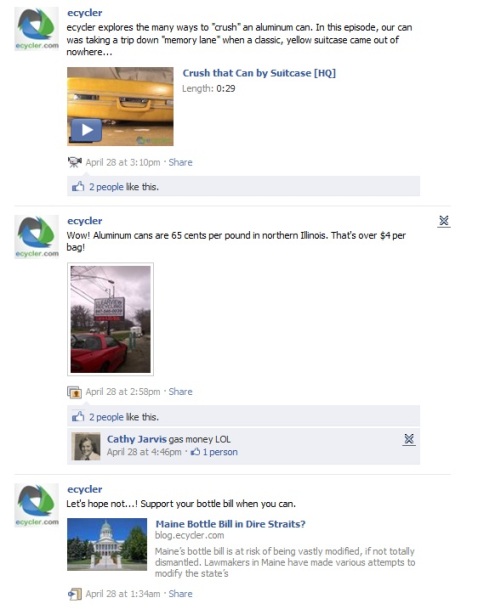
The company might share how its collectors use recyclables to make art, updates on bottle-bill legislation or one of its “Crush that Can” videos.
For the latter, YouTube serves as the home for the more than 70 videos ecycler.com has created, most of which show funny and creative ways to crush aluminum cans – by pumpkin, suitcase or truck, for example.
The “Crush that Can” montage shows 50 different ways to crush an aluminum can.
Award-Winning Results
In February, ecycler.com's social media efforts paid off in more than site traffic and new site registrants. The company participated as a finalist in a 3-month Small Business Road-to-Success Challenge from Fairfield Inn & Suites.
During that time, the company could stay free at the hotels while traveling. In exchange, finalists had to meet specific business goals they set for themselves.
In that time, ecycler.com exceeded its goals by registering 151 new collectors and 623 new discarders – largely through proactive social media tactics – leading the company to win the $20,000 grand prize.
At the same time, the company won one of the smaller challenges by landing coverage on five related blogs.
With its winnings, ecycler.com now turns its attention to adding new features for discarders and collectors, such as an iPhone application. As it grows, it will continue to apply the scrappy, proactive social media tactics that have built the company's momentum to date.
Cultivate relationships – Remember the “social” in social media, rather than just blasting out updates. Twitter lets you build relationships and trust over time in a way that works for both sides.
Be visual – Nearly every ecycler.com post on Facebook includes a photo or video. Consider how to add a visual component to all your posts.
Focus on what works – ecycler.com seeded its own wiki with hundreds of articles but it just didn't pull traffic like other social media or the company's own blog.
What's your best example of how social media helped you forge a valuable business relationship? Leave your comments in the box below.
Attention Agency Owners, Brand Marketers, and Consultants

Introducing the Marketing Agency Show–our newest podcast designed to explore the struggles of agency marketers.
Join show host and agency owner, Brooke Sellas, as she interviews agency marketers and digs deep into their biggest challenges. Explore topics like navigating rough economic times, leveraging AI, service diversification, client acquisition, and much more.
Just pull up your favorite podcast app, search for Marketing Agency Show and start listening. Or click the button below for more information.

